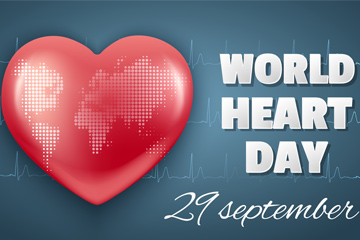Every year September 29 is celebrated as World Heart Day to create awareness about and fight against cardiovascular disease. Cardiovascular disease is the world’s leading cause of death that claims about 18.6 million lives each year. Modern lifestyles have made people unhealthy. They spent a lot of their time in front of the computer, eat junk food, sleep late and shun physical activity. A sedentary lifestyle, smoking and excessive alcohol consumption can cause high blood pressure, high blood glucose, overweight and obesity, which in turn, trigger cardiovascular diseases. To minimize the chances of getting cardiovascular disease, it’s important to adopt a heart-healthy lifestyle. Here are some tips to get you started:
- Minimize Intake of Salt: Increased salt intake is likely to increase your blood pressure and increase your risk of getting heart disease or stroke. The recommended maximum daily intake of salt is just 6g for adults and 3g for children (2.5g of salt is the equivalent of 1g of sodium). Reduce the amount of salt used in cooking and check on food labels to know how much salt you’re eating in processed foods. Foods with more than 1.5g salt or 0.6g sodium per 100g are high, which should be avoided.
- Eat More Fruits and Veggies: Increase the amount of potassium in your diet by eating at least five portions of fruit and veg a day (potassium can help to lower blood pressure). The nutrients in fruit and vegetables – including vitamins, minerals and fibre – can help to keep your heart healthy. Fruits and vegetables that are rich in soluble fibre that can help to lower your cholesterol include citrus fruits, sweet potato, aubergine, mango and most beans and pulses.
- Eat Fish: Oily fish like sardines, mackerel, salmon and fresh tuna are rich in omega-3 fatty acids that are good for your heart because it improves good cholesterol levels. If you’re a vegetarian you can get omega-3 fats from spinach, wheat germ, walnuts, flaxseed and flaxseed oil, soya and canola oil and pumpkin seeds.
- Reduce the Consumption of Sugar: Too much sugar in your diet could lead to weight gain, rising blood pressure which leads to diabetes and heart disease. If you have a sweet tooth and can’t give up sugar, choose healthier options like fresh fruit with yoghurt instead of sweetened puddings and cakes.
- Exercise Daily: Studies and researches have stated that people who are not physically active are more likely to have a heart attack than those who are. Aim to get at least 150 minutes of moderate-intensity activity a week to lower your risk of developing coronary heart disease. You can split up the 150 minutes any way you like. For instance, take a brisk 30-minute walk at lunchtime during the week.
- Limit Saturated Fat: Avoid eating too much saturated fat. Butter, margarine, fatty meats, dairy fats and processed foods have saturated fats that will increase cholesterol levels. Switch to semi-skimmed milk and low-fat dairy foods instead of full-fat ones, choose lean cuts of meats, and steam or grill instead of frying.
- Watch your Weight: Obesity increases the risk of high blood pressure, high cholesterol and type 2 diabetes. Eating less sugar and saturated fat while cutting back on alcohol, eating more fruit and veg and getting more exercise can all help you reduce weight and get fit and healthy.
- Avoid Smoking: Smoking is one of the major causes of cardiovascular disease, and smokers are almost twice as likely to have a heart attack compared with those who have never smoked. This is because smoking can damage the lining of your arteries and reduce the amount of oxygen in your blood and raise your blood pressure. If you are struggling to quit smoking, consult your doctor.
- Reduce Intake of Alcohol: Excessive intake of alcohol can affect heart health by causing high blood pressure, abnormal heart rhythms and damage to the heart muscle. Quit or drink alcohol only in moderation – up to 1 drink in a day for women and up to 2 drinks in a day for men (health.gov).
- Control Stress: In addition to staying physically healthy, pay attention to your mental health. Chronic stress can lead to high blood pressure, which can increase risk for heart attack and stroke. Do yoga or meditation to control stress. You can also seek professional help to manage stress.
Following these strategies can help maintain heart health and minimize your risk of getting cardiovascular disease.
